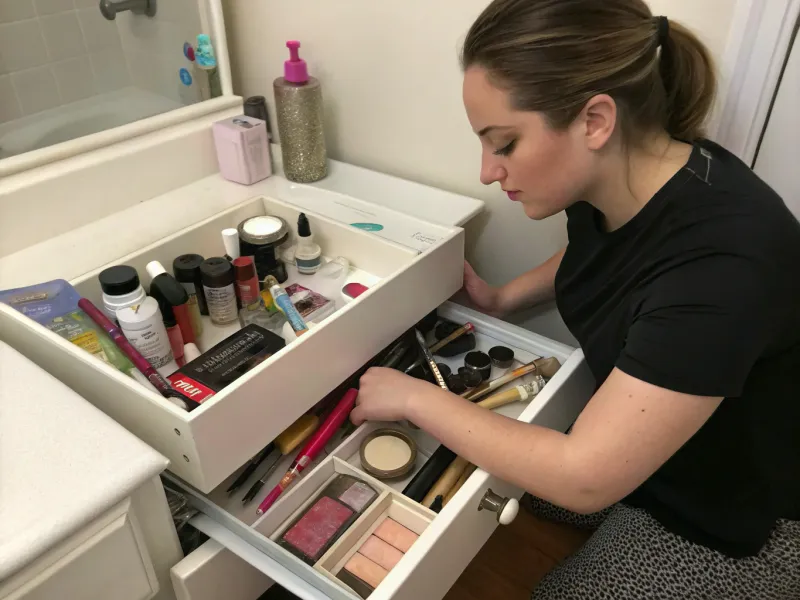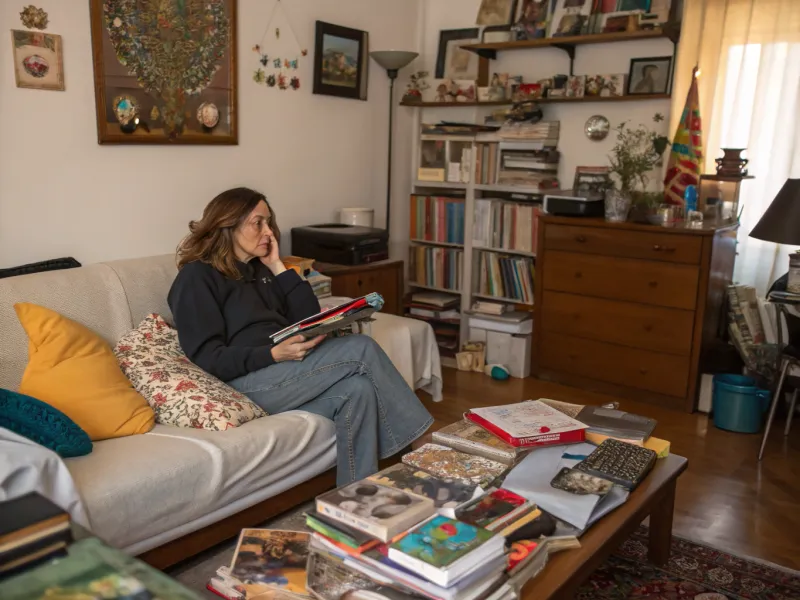22 cose da abbandonare per una vita più felice e leggera
Life has a way of piling up, doesn’t it? From the stuff gathering dust in the corner to the thoughts weighing on your mind, it’s easy to feel overwhelmed.
But here’s the thing: clearing out what’s no longer serving you—whether it’s physical clutter or mental baggage—can feel downright liberating.
Siete pronti ad alleggerire il vostro carico e a ravvivare la vostra atmosfera? Allora quest'anno dovete sbarazzarvi di:
1. Relazioni tossiche

Breaking free from toxic relationships can be challenging yet incredibly freeing. I once clung to a friendship that drained me emotionally, hoping things would get better. Spoiler: they didn’t.
Letting go doesn’t mean you don’t care; it means you care about yourself enough to walk away. Surround yourself with those who uplift, not drag you down. Recognize the red flags and set boundaries to protect your well-being.
Picture yourself surrounded by people who cherish and support you, sharing laughter instead of tears. It’s empowering to choose connections that nurture your soul. Life’s too short for relationships that don’t bring positivity to the table.
2. Vestiti vecchi

We’ve all been there, holding onto that pair of jeans from college, hoping they’ll make a comeback in our wardrobe. It’s time to face the facts: if you haven’t worn it in over a year, it’s probably safe to part ways. I remember staring at my wardrobe, overwhelmed by how many clothes I owned but never wore. Each piece I let go of felt like a weight lifted off my shoulders.
Liberarsi dei vecchi vestiti può essere un'esperienza liberatoria. Si scopre uno spazio che non si sapeva di avere e si invita a portare nuova energia nella propria vita. Inoltre, donare i vestiti dà loro una seconda vita e aiuta qualcuno che ne ha bisogno.
Think of it as a chance to redefine your style and embrace who you are right now. Trust me, your future self will thank you for making room for outfits that make you feel fabulous every time you step out the door. Life’s too short for clothes that don’t bring you joy!
3. Trucco scaduto

Ah, the makeup drawer – a black hole of forgotten products. I once found a lipstick so old it was practically fossilized. It’s easy to forget expiry dates, but using old makeup can be a recipe for skin disasters.
Sorting through your makeup stash can be oddly satisfying. It’s like rediscovering old favorites while saying goodbye to those that have seen better days. Remember, fresh products mean fresher skin, and that’s always a win.
So, take a day, play some music, and sort through those piles. Imagine the joy of a neat, organized collection where everything is usable and nothing is past its prime. It’s not just about cleanliness; it’s about treating yourself with care and love.
4. Spazi abitativi disordinati

There’s something magical about walking into a tidy room. I used to let clutter pile up, thinking I’d get to it later, but it only added to my stress. Decluttering is like shedding layers of unnecessary worry.
Start small, maybe with a drawer, and gradually tackle larger areas. You’ll notice a shift in your environment and mood. A clutter-free space can inspire creativity and calm, making your home a sanctuary.
Imagine cozying up on the couch with a book, your mind clear and your surroundings peaceful. It’s amazing how much lighter life feels without the weight of clutter. Plus, a tidy space is just more inviting!
5. Procrastinazione

Oh, procrastination – the art of putting off until tomorrow what could be done today. I used to be the queen of ‘later,’ until ‘later’ turned into ‘never.’ Tackling tasks head-on can feel daunting, but the relief afterwards is worth it.
Suddividete i compiti in parti più piccole e gestibili per evitare di sentirvi sopraffatti. Anche stabilire delle scadenze aiuta a responsabilizzarvi e a motivarvi. La soddisfazione di cancellare le voci dalla lista delle cose da fare è imbattibile.
Immaginatevi di finire la giornata con tutte le caselle selezionate, sentendovi realizzati e pronti a rilassarvi. Liberarsi dalla procrastinazione è come sbloccare il vostro potenzialeun compito alla volta. Abbracciate la produttività e guardate la positività fluire nella vostra vita.
6. Abbonamenti non necessari

Subscriptions can sneak up on us, silently draining our bank accounts. I once realized I was paying for a magazine I hadn’t read in months. It was a wake-up call to reevaluate what I truly needed.
Take a moment to review your subscriptions, and cancel those you no longer use. It’s like trimming the fat from your budget, leaving more room for the things you love.
Think of it as a detox for your finances, clearing out what doesn’t serve you. Imagine the relief of knowing exactly where your money is going, without surprise fees. Financial clarity can bring a wave of positivity and peace of mind.
7. Disordine digitale

Our devices often become magnets for unused apps and files. At one point, my phone had over 200 apps, most of which hadn’t been touched in months. Clearing out your digital space can do wonders for your mental clarity and productivity.
Iniziate a identificare le app che non usate più e a organizzare quelle che conservate in cartelle ordinate. Pensate a questo come a un necessario restyling del vostro telefono, per creare un'esperienza digitale più pulita e snella.
Il risultato? Navigare nel telefono è un gioco da ragazzi, con tutto ciò che serve al posto giusto. Questa ritrovata semplicità vi farà sentire più leggeri e padroni della vostra routine quotidiana.
8. Confrontarsi con gli altri

Social media makes it easy to fall into the trap of comparisons. I used to scroll endlessly, feeling inadequate when I saw others’ highlight reels. It’s easy to forget that these snapshots don’t show the whole story.
Concentrate la vostra attenzione sui vostri successi e sulle cose che vi rendono unici. Invece di lasciarvi trascinare dai social media, affrontateli come uno spazio di ispirazione piuttosto che di confronto.
With time, you’ll find yourself appreciating others’ successes while staying grounded in your own journey. Breaking free from the comparison loop allows you to experience more joy and self-confidence.
9. Parlare di sé in modo negativo

Being overly critical of yourself can quietly undermine your confidence. I used to find myself repeating, “You’re not good enough,” until I realized how much harm those words were causing.
Per cambiare questi pensieri è necessaria la pratica e la consapevolezza di sé. Quando si insinua un pensiero negativo, fermatevi e sostituitelo con qualcosa di più compassionevole o incoraggiante.
Looking back, I’ve seen how small affirmations can brighten your mindset, fostering self-love and optimism. Transforming how you speak to yourself can bring a sense of freedom and happiness you didn’t know you were missing.
10. Il senso di colpa

Il peso del senso di colpa può persistere a lungo dopo che il momento è passato. Ricordo di essermi aggrappata al senso di colpa per piccole cose, lasciando che occupasse spazio nella mia mente e nel mio cuore per troppo tempo.
Riconoscere ed elaborare il senso di colpa è il primo passo per liberarsene. Perdonare se stessi e imparare dall'esperienza vissuta apre la strada alla guarigione e alla crescita.
You’ll feel a sense of relief as you let go, like shedding a heavy coat on a warm day. This shift allows you to embrace life with a lighter, freer spirit.
11. Rimpianto

Regret has a way of keeping you stuck in the past, replaying old mistakes on a loop. I’ve spent countless hours wishing I could go back and change things, only to realize it was holding me back from living fully.
Cercate invece di vedere il rimpianto come un insegnante. Le lezioni apprese dalle decisioni passate possono guidarvi a fare scelte migliori per il futuro.
As you reflect on your experiences, you may notice how far you’ve come because of them. Letting go of regret can open the door to a present filled with gratitude and possibility.
12. Stress non necessario

Lo stress è una parte inevitabile della vita, ma lo stress inutile spesso deriva da cose che possiamo controllare. Ero solita lasciare che i piccoli inconvenienti mi appesantissero, finché non mi sono resa conto che molti di essi erano autoimposti.
Identifying your main stressors and finding ways to manage them can make a huge difference. Whether it’s through setting boundaries, mindfulness, or healthy coping strategies, reducing unnecessary stress is a gift you give yourself.
Una mentalità più calma porta a una migliore concentrazione e a una maggiore energia per godersi le cose che si amano. Affrontando attivamente lo stress, si crea una vita quotidiana più serena e soddisfacente.
13. Perfezionismo

La ricerca della perfezione può sembrare ammirevole, ma spesso crea una pressione inutile. Un tempo pensavo che tutto dovesse essere impeccabile, ma questa mentalità mi lasciava bloccata, incapace di andare avanti.
Lasciare spazio agli errori aiuta a imparare e a crescere. Il progresso, non la perfezione, è il vero successo.
Quando si smette di preoccuparsi del risultato e ci si concentra sul processo, la creatività fluisce più liberamente. Abbracciare l'imperfezione invita a nuove opportunità e rende il viaggio più piacevole.
14. Tempo eccessivo davanti allo schermo

Spending hours glued to screens can sap your energy and leave you feeling disconnected from the world around you. I used to scroll through social media mindlessly, realizing only later how much time I’d wasted.
Fare delle pause intenzionali dalla tecnologia permette di riconnettersi con se stessi e con chi ci circonda. Stabilire orari specifici per staccare la spina può creare spazio per esperienze più significative.
Una delle migliori ricompense è trovare gioia nei momenti del mondo reale, come le conversazioni o il tempo trascorso nella natura. Ridurre il tempo trascorso sullo schermo aiuta a sentirsi più presenti e impegnati nelle cose che contano davvero.
15. Vecchi rancori

Grudges can weigh heavily on your heart, even if you don’t realize it. I once held onto resentment for years, only to discover that it hurt me far more than anyone else.
Choosing forgiveness isn’t about forgetting—it’s about freeing yourself from the grip of negativity. Letting go of past hurts clears the way for inner peace and happiness.
By releasing grudges, you create room for love and joy to enter your life again. It’s a transformative act that lightens your spirit and strengthens your relationships.
16. Abitudini malsane

Habits that don’t serve you can creep into your routine without much notice. I used to skip breakfast, thinking it saved time, but it left me feeling sluggish and unfocused.
Sostituire queste abitudini con alternative più sane è un processo graduale che può portare a un cambiamento duraturo. Iniziate con piccoli aggiustamenti che vi sembrino gestibili e proseguite da lì.
L'energia e la vitalità che otterrete adottando abitudini migliori faranno una differenza notevole. Prendersi cura di sé in questo modo è un investimento per un futuro più felice e più sano.
17. Paura del cambiamento

Il cambiamento può intimorire, ma rimanere nella propria zona di comfort può impedire di raggiungere il proprio potenziale. Un tempo resistevo al cambiamento, aggrappandomi a ciò che mi sembrava sicuro, anche quando non mi rendeva più felice.
Visualizzazione il cambiamento come opportunità di crescita e il rinnovamento possono cambiare la prospettiva. Ogni nuovo passo offre la possibilità di imparare ed espandere i propri orizzonti.
As you embrace new possibilities, you’ll find a sense of excitement and empowerment that comes with stepping into the unknown. Change often leads to breakthroughs you didn’t know were possible.
18. Giudizio degli altri

It’s easy to fall into the habit of judging others, especially when they make choices you don’t understand. I used to be quick to criticize, only to realize it was often a reflection of my own insecurities.
Spostare la propria mentalità verso l'empatia e la curiosità può aiutare a vedere le persone sotto una nuova luce. Invece di giudicare, cercate di capire la loro prospettiva e le esperienze che le hanno formate.
Questo approccio favorisce connessioni più profonde e un senso di compassione, aiutandovi a creare un mondo più positivo e inclusivo intorno a voi.
19. Vivere nel passato

Spending too much time dwelling on past mistakes or glories can prevent you from fully appreciating the present. I’ve caught myself longing for the “good old days,” only to miss out on what was right in front of me.
Learning to focus on the here and now helps you build a life filled with gratitude and purpose. The past can inform your decisions, but it doesn’t have to define your present.
Con questa mentalità, ogni momento diventa un'opportunità per creare qualcosa di significativo e nuovo. Vivere il presente apre le porte alla felicità e alla realizzazione.
20. Eccessivo impegno

Assumere troppe cose in una volta sola può farvi sentire svuotati e sopraffatti. Ero solita dire di sì a ogni richiesta, pensando che fosse la cosa giusta da fare, ma questo mi lasciava esausta e insoddisfatta.
Learning to set boundaries and prioritize your commitments helps you find balance. Saying no when necessary isn’t selfish—it’s essential for your well-being.
When you have space in your schedule, you can focus on what truly matters, whether it’s spending time with loved ones or pursuing personal passions.
21. Paura del fallimento

La paura di fallire può impedirvi di perseguire i vostri sogni e di correre rischi che potrebbero portarvi a crescere. Un tempo evitavo di provare cose nuove semplicemente perché avevo paura di sbagliare. Ma rimanere nella mia zona di comfort portava solo a rimpianti.
La verità è che il fallimento è spesso un trampolino di lancio verso il successo. Ogni errore vi insegna qualcosa di prezioso. Invece di temere il fallimento, consideratelo come una parte necessaria dell'apprendimento e del miglioramento.
Once you let go of the fear, you’ll find yourself embracing opportunities with more confidence. The freedom to try, fail, and try again is what leads to real progress and fulfillment.
22. Saying ‘Yes’ When You Mean ‘No’

People-pleasing can quickly drain your energy and leave you feeling resentful. I used to say yes to things just to keep others happy, even when I knew I didn’t have the time or energy. It took me a while to realize that setting boundaries isn’t selfish—it’s necessary.
Learning to say ‘no’ allows you to protect your time and emotional well-being. It helps you focus on the things that truly matter to you, rather than overextending yourself for the sake of others.
Imagine the peace of mind that comes with honoring your own needs. The more you practice saying no when necessary, the more control you’ll have over your life and happiness.







